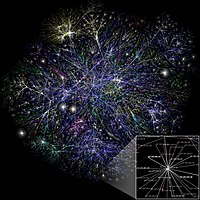
Photo from wikipedia
Social development is crucial in the ontogeny of animals living in complex societies and has lasting consequences in adulthood. Spotted hyenas (Crocuta crocuta) live in fission-fusion societies as complex as… Click to show full abstract
Social development is crucial in the ontogeny of animals living in complex societies and has lasting consequences in adulthood. Spotted hyenas (Crocuta crocuta) live in fission-fusion societies as complex as those of cercopithecine primates. The social positions adult hyenas hold within their groups are complex and varied, but little is known about how those positons emerge and change over the course of development. Using social network analysis (SNA), we tested predictions of hypotheses suggesting that sex and dominance status affect the social network positions of young hyenas across three stages of ontogeny: (1) while living at the communal den, (2) den independent but pre-reproductive, and (3) early adulthood. By examining rates at which hyenas were found alone and their association networks, aggression networks, and affiliation networks, we observed striking changes in individuals’ network positions across ontogeny, as well as pronounced sex differences. With the exception of rates at which individuals were found alone, which increased over ontogeny, most social network position metrics decreased greatly from infancy to adulthood. However, females showed considerably more rank-related variation in this trajectory than did males. Overall, social rank had stronger effects on the development of social network positions in females than males. Thus, females and males have different social development trajectories that appear to prepare them for their different respective futures of integrating into their natal clan or dispersing to a new one.Significance statementSocial development is difficult to study, particularly in long-lived gregarious mammals, so little is known about the variables shaping the emergence during ontogeny of social roles played by adults. We used social network analysis to investigate how sex and rank affect the social positions of maturing spotted hyenas as their positions change across ontogenetic development. Females develop more complex social positions than males early in life, with strategies that vary with their dominance status. Although males are just as well connected to group-mates as females when they are cubs, they generally disengage from the natal clan as they mature; males clearly do not disperse because they are aggressively expelled from their natal group. Our data suggest for the first time that social development appears to prepare females and males for their alternative futures of philopatry or dispersal.
Journal Title: Behavioral Ecology and Sociobiology
Year Published: 2017
Link to full text (if available)
Share on Social Media: Sign Up to like & get
recommendations!